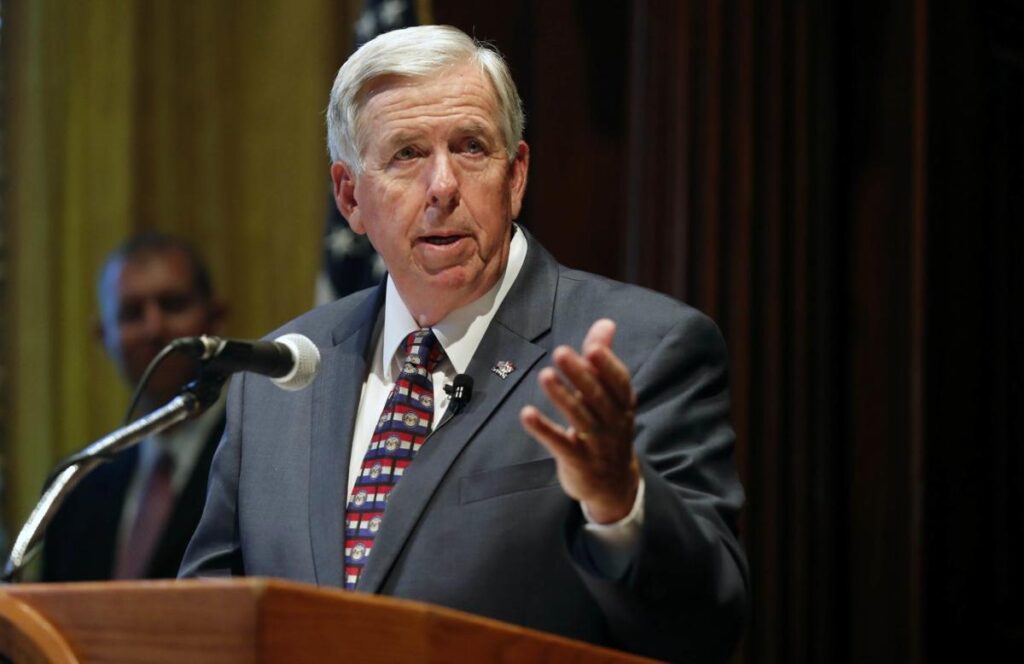Missouri spending $30 million for temporary hospital staffing, COVID-19 antibody infusion centers

Missouri will spend $15 million to provide temporary staffing for hospitals operating under the stress of treating thousands of COVID-19 patients, Gov. Mike Parson said Wednesday.
Parson also announced a $15 million program to establish five to eight monoclonal antibody infusion stations to operate for 30 days throughout the state. Monoclonal antibodies are proteins to help fight off COVID-19 and reduce the risk of severe disease and hospitalization. It’s typically administered to high-risk patients after diagnosis. The state estimates 2,000 patients will be treated by the project.
Both programs will be funded through the state’s portion of the federal Coronavirus Aid, Relief and Economic Security (CARES) Act.
“We know our hospital capacity is limited due to staffing shortages, not a lack of bed capacity,” Parson said during a Wednesday news conference. “Every critical- and acute-care licensed hospital will have access to this program. Staffing allocations depend on the number of licensed beds per hospital. It is our hope this program will decrease hospital capacity strain caused by staffing shortages and decrease the need for future alternative care sites.”
In addition to hospitals, the department of health, veteran’s commission, department of corrections and the department of social services’ division of youth services will be eligible for the staffing support.
Both programs were praised by the Missouri Hospital Association.
“These are both good, targeted strategies to take pressure off hospitals,” said Dave Dillon, vice president of public and media relations for the Missouri Hospital Association.
Missouri had 2,200 COVID-19 patents in its hospitals on Sunday; 644 were in intensive care units (ICU) and 373 on ventilators. Missouri has 22,000 hospital beds, including 2,700 ICU beds. There are 2,300 ventilators in facilities and the state has a stockpile of 24 additional ventilators.
“The challenges hospitals are facing are less about space and more about staff,” Dillon said. “We have beds, but those beds are only as good as the clinicians we can put at the bedside. As we are seeing a COVID-19 surge on top of an already high hospital daily census, the only way to manage is to add staff.”
The state-run monoclonal antibody centralized infusion center in Springfield was set up last month and staffed by the Missouri Disaster Medical Assistance Team, with support from local hospitals. The Springfield center also treated about 300 COVID-19 patients, reducing the number of hospital beds required.
“For those who test positive and are having significant symptoms, this therapy can be the difference between a good outcome and a bad outcome,” Dillon said.
Robert Knodell, the acting director of the department of health and senior services, said medical staff from outside Missouri will be brought in by a vendor once a contract is finished.
“The state has entered into discussions with potential contractors across the country that have traveling medical professionals that move around the country into surge situations or severe events, whether it’s an infectious disease, hurricane or other extreme event,” Knodell said. “We have been assured those individuals will be available if contracted by the state and our local health care partners.”
Parson said ongoing communication with health care systems in Springfield and around the state will help meet medical needs caused by the pandemic.
“I think all of the resources we have put in there – infusion centers, ambulance resources, respiratory guidelines that were waved to get people in to help – from the state level, it still comes down to what they need,” Parson said. “They’re going to have to work with these companies because they won’t just send 200 people. Hospitals will have to say what they need and it will be determined whether that’s available. But I think we can distribute this around the state of Missouri. There’s going to be an opportunity for hospitals in both rural or urban to take advantage of this program.”
Parson said daily and weekly COVID-19 vaccination rates increased approximately 50% during the last three weeks, coinciding with the launch of the state’s $9 million vaccine lottery program.
“Citizens have a role as well,” Dillon said. “Vaccination can reduce the chance of severe illness, hospitalization and death. Prevention is better than cure.”
Parson attributed the rise in vaccinations to multiple types of messages directed to citizens, urging them to have conversations about vaccines.
“Now is the time to step up and take personal responsibility to protect yourself and your loved ones by getting vaccinated,” Parson said.
This article was originally posted on Missouri spending $30 million for temporary hospital staffing, COVID-19 antibody infusion centers







